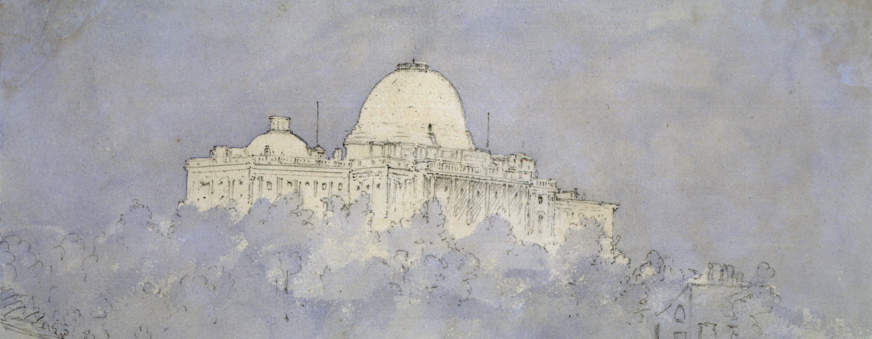Touring America’s backwater capital in the 1840s, author Charles Dickens famously described Washington, DC, as the “City of Magnificent Intentions.”
In other words, he was less than impressed.
But, the Twenty-Third Amendment, ratified in 1961, may have played a small part in rewriting the city’s trajectory.
Washington, DC, is, indeed, a strange anomaly; a city purporting to enshrine democratic values, which, nevertheless, lacks representation for its permanent residents. While “Boz” referred primarily to the district’s unrealized architectural designs (he wasn’t a fan of the politicans, either), it’s true that, for Washingtonians, the aspiration to vote for president was, for well over a century, nothing more than a frustrated intention. Still to this day, the District denies its residents congressional representation (although it permits a nonvoting delegate to attend Congress); “Taxation without representation,” DC license plates blazon with more than a hint of petulance.
All of this is by the Founders’ design. Article I entrusts Congress to “exercise exclusive Legislation in all Cases whatsoever, over such District (not exceeding ten Miles square) as may, by Cession of particular States, and the Acceptance of Congress, become the Seat of Government of the United States….” Washington, DC, may have a mayor (don’t get Trump started on Muriel Bowser), but the Framers intentionally eschewed a governor or state legislature. Why? James Madison explains in Federalist 43:
“Without [complete authority at the seat of government],” he wrote, “not only the public authority might be insulted and its proceedings interrupted with impunity; but a dependence of the members of the general government on the State comprehending the seat of the government, for protection in the exercise of their duty, might bring on the national councils an imputation of awe or influence, equally dishonorable to the government and dissatisfactory to the other members of the Confederacy. This consideration,” he continued, “has the more weight, as the gradual accumulation of public improvements at the stationary residence of the government would be both too great a public pledge to be left in the hands of a single State, and would create so many obstacles to a removal of the government, as still further to abridge its necessary independence.”
Subjecting the national authority to the idiosyncrasies of a single state government presented too many risks and obvious conflicts of interest. As Alan Wilson, the Attorney General of South Carolina, maintained in his case against DC statehood, admitting the District as a sovereign jurisdiction “would create a super-state with unrivaled power.”
It’s an unfortunate (but necessary) reality for this misfit casualty of exacting checks and balances. But can the city’s residents at least vote in presidential elections? For most of American history, the answer was no.
“Each State shall appoint … a Number of Electors, equal to the whole Number of Senators and Representatives to which the State may be entitled in the Congress,” Article II specifies. Obviously, this would exclude Washington.
However, on June 16, 1960, Congress proposed a constitutional amendment permitting DC to participate in the Electoral College as “if it were a State.” Interestingly, both Alaska and Hawaii had joined the Union in 1959, making the proposed amendment the first in history to require ratification from 38 states (the same threshold applicable for modern amendments). Backed by President Dwight D. Eisenhower, the proposal breezed through three-fourths of the state legislatures in less than a year: on March 29, 1961, when Kansas and Ohio both approved the measure, the District of Columbia formally received the right to participate in presidential elections. Specifically, the Twenty-Third Amendment provided the City of Magnificent Intentions with three electors.
The first election impacted by this relatively minor shakeup was the 1964 contest between conservative icon Barry Goldwater and the late John F. Kennedy’s successor, Lyndon B. Johnson. DC voted for Johnson. Since then, including during Republicans’ 1972 and 1984 49-out-of-50-state landslides, DC has always cast its three electoral votes for the Democratic candidate, with one notable exception: in 2000, Vice President and Democratic Nominee Al Gore lost an electoral vote when one of DC’s electors cast a blank ballot to protest the District’s lack of representation in Congress.
“Folks, I have cast my ballot for the colonists in the District of Columbia,” announced Barbara Lett Simmons.
For all the reasons Madison outlined in Federalist 43, it may appear that this problem is unsolvable. Yet, the Twenty-Third Amendment reminds us that while the Founders were meticulous and thoughtful in their design, they also provided a process for future generations to amend the Constitution as needed.
The City of Magnificent Intentions has come a long way since Mr. Dickens walked its streets, and not all changes have been for the better. If, in his view, Washington, in the 1840s, was tainted by “strife of politics so fierce and brutal, and so destructive of all self-respect in worthy men, that sensitive and delicate-minded persons shall be kept aloof,” we shudder to think what he would say today.
Fortunately, Article V — the Constitutiton’s amendment clause — still promises hope for a brighter future for the nation’s capital.
The Twenty-Third Amendment and a backwater town
Published in Blog on March 28, 2025 by Jakob Fay






